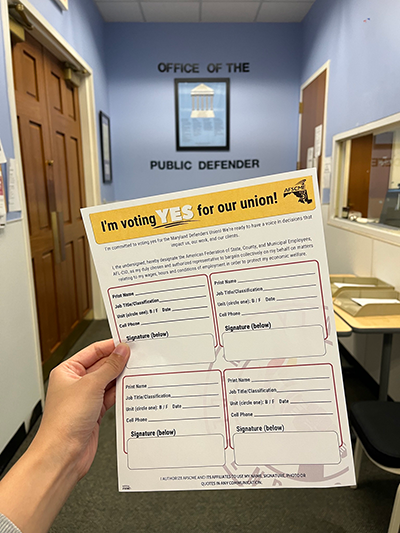
ANNAPOLIS, Md. – Workers at the Maryland Office of the Public Defender (OPD) won their union election and have voted to certify AFSCME Maryland Council 3 as their exclusive bargaining representative.
One bargaining unit will consist of core (administrative and support) staff, and another bargaining unit will consist of intake staff, investigators, social workers and attorneys. These two bargaining units span the entire state in 12 districts and include over 600 OPD workers.
For the unit representing intake staff, social workers, investigators and attorneys, workers voted 233-8 in favor of their union. For the unit representing core staff, workers voted 45-1 in favor of their union.
The secret ballot election was conducted via mail over a two-week period from Nov. 15-Dec. 1.
"For too long, we’ve been discounted, disrespected and undervalued,” said Kalia Woods, an administrative aide with the Prince George’s County OPD office. “Decisions have been made that draw dividing lines between us and ultimately affect the work we are able to do for our clients. We have sent a message with this vote that we are standing together to say ‘not anymore.’”
This success comes after more than two years of organizing efforts by these workers. The
Maryland Defenders Union (AFSCME Local 423/MDU) first announced their intent to unionize in August 2020.
Workers cited inadequate staffing levels, record high turnover rates, and impossibly high workloads and caseloads as some of the main reasons they sought to unionize.
“Staff are leaving because there aren’t enough resources to do our jobs adequately and ethically, because of oppressive workloads and caseloads that never get more manageable, and because we have been ignored when calling out for change,” said Marci Tarrant Johnson, public defender in the Baltimore City OPD office and president of the Maryland Defenders Union.
In the 2022 legislative session, AFSCME members worked with state legislators, including bill sponsors Del. Shaneka Henson and Sen. Pam Beidle, to pass legislation (HB90/SB255) to expand collective bargaining rights to OPD employees, including changing the designation of OPD attorneys from special appointee status to merit status.
Throughout this process, workers advocated tirelessly – through labor management committees, public testimony at the legislature, workplace actions and more – for better working conditions and respect, a voice in critical decision-making and the right to speak up without fear of retribution or retaliation. They also called for transparency in the agency’s financial and resourcing decisions as well as recruiting and retention efforts.
"I've been at OPD for over 11 years, fighting for more just systems and outcomes for our clients
every day," said Angie Chou, a social worker with the Prince George’s County OPD office. “I’ve seen our collective voices finally be heard in a way that our individual voices simply are not. Now that we've won the right to negotiate our wages and working conditions, we're able to accomplish even more. We're going to continue to fight for the resources we need to positively impact all of us at OPD, our clients and their communities.”
With this win, OPD workers will join nearly 30,000 Maryland state and higher education employees who have collective bargaining rights in their agencies and workplaces.
“This is a big win for OPD workers who have been fighting to have their voices heard and
respected in their workplaces,” said Patrick Moran, president of AFSCME Maryland Council 3. “Now, they join AFSCME members across the state who enjoy the benefits of their collective bargaining agreements. Together, we will continue to organize for the pay, respect and better working conditions every state worker deserves.”
